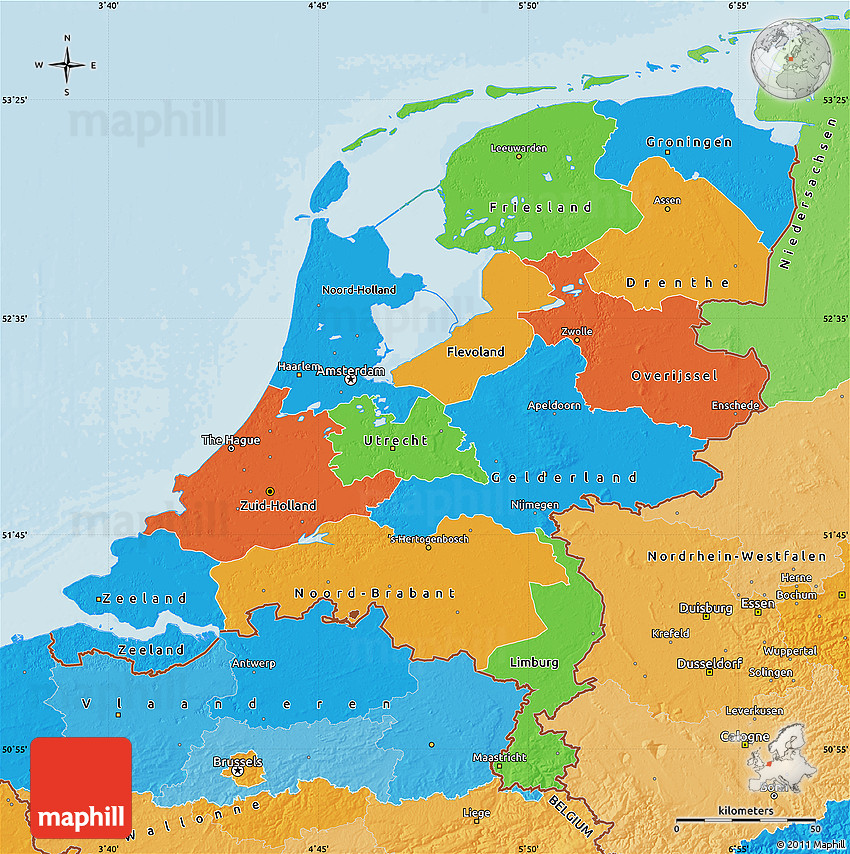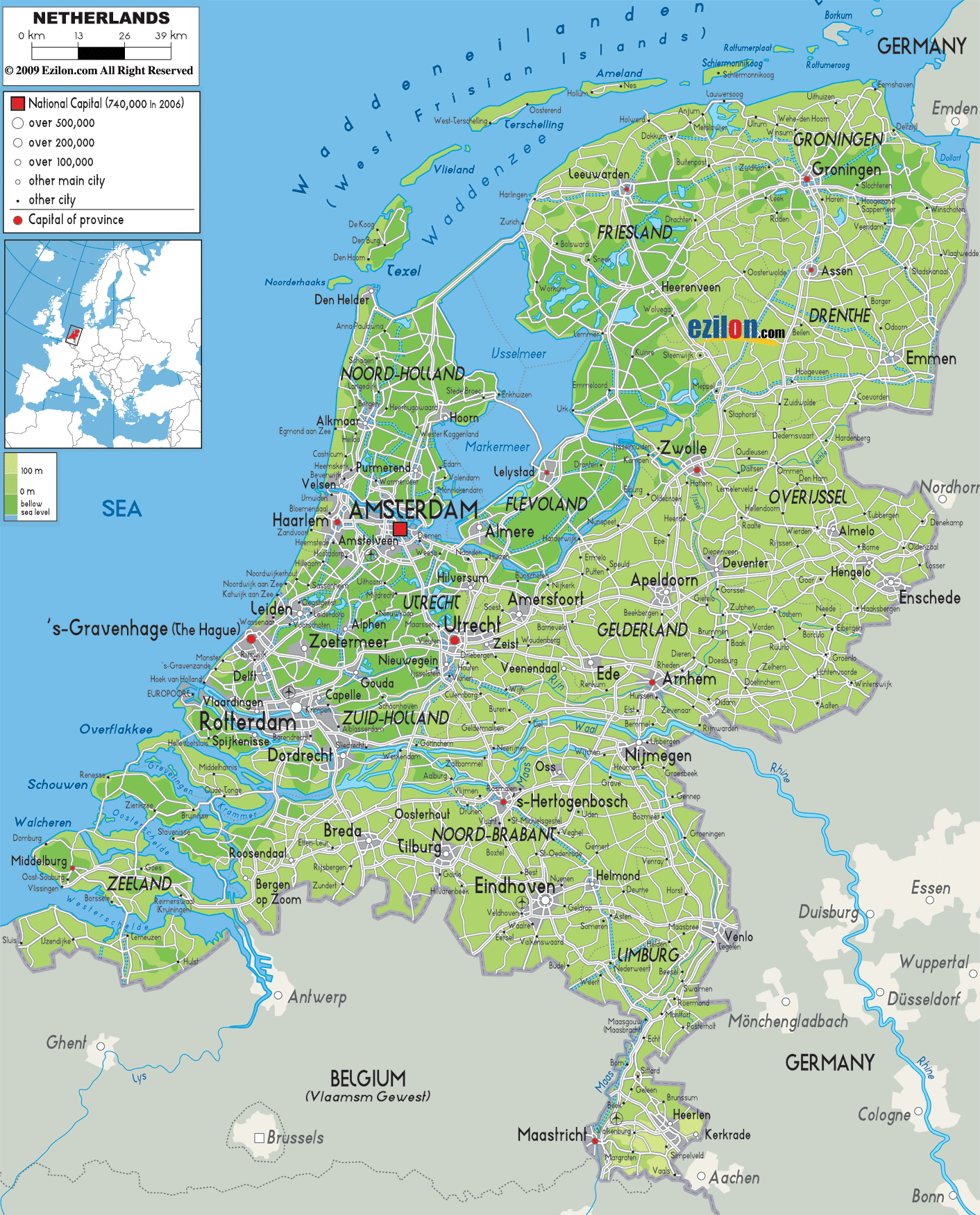The Netherlands: A Geographic and Geopolitical Perspective
Related Articles: The Netherlands: A Geographic and Geopolitical Perspective
Introduction
In this auspicious occasion, we are delighted to delve into the intriguing topic related to The Netherlands: A Geographic and Geopolitical Perspective. Let’s weave interesting information and offer fresh perspectives to the readers.
Table of Content
The Netherlands: A Geographic and Geopolitical Perspective

The Netherlands, often referred to informally as Holland, occupies a unique position in the European landscape and, consequently, on the world map. Its relatively small size belies its significant global influence, stemming from a complex interplay of historical factors, geographical advantages, and strategic economic policies. Understanding its location and the resulting implications requires examining its geographical context, historical development, and contemporary role in the international arena.
Geographical Context:
Situated in Northwestern Europe, the Netherlands shares borders with Germany to the east, Belgium to the south, and the North Sea to the west and north. This coastal location has profoundly shaped its history and development. The country’s low-lying terrain, much of it below sea level, necessitates constant vigilance against flooding, resulting in sophisticated water management systems that have become internationally renowned. This expertise in hydraulic engineering has translated into global partnerships and projects addressing similar challenges in other vulnerable regions.
The proximity to major European powers has also played a crucial role. The Netherlands’ central location within the European Union facilitates trade and transport links across the continent. Its major ports, particularly Rotterdam, serve as crucial gateways for international commerce, connecting Europe to global markets. This strategic positioning has contributed significantly to the nation’s economic prosperity and its role as a major player in international trade. Furthermore, the country’s extensive network of canals and waterways provides efficient internal transport infrastructure, supporting both domestic and international trade.
Historical Development and Global Influence:
The Netherlands’ historical trajectory has been marked by periods of significant global influence. The "Dutch Golden Age" (17th century) saw the nation emerge as a major maritime power, establishing extensive trade networks across the globe. The Dutch East India Company, one of the earliest multinational corporations, played a pivotal role in shaping global trade routes and establishing colonies in various parts of the world, including Indonesia, South Africa, and the Americas. This legacy continues to shape relationships and cultural exchanges between the Netherlands and many countries today.
Following its colonial period, the Netherlands transitioned into a modern, highly developed nation. Its participation in international organizations, such as the United Nations and the European Union, reflects its commitment to multilateralism and global cooperation. The country consistently ranks highly in international indices measuring factors such as economic freedom, human development, and press freedom, signifying its commitment to democratic values and the rule of law. This strong international reputation contributes to its influence in global affairs.
Economic Significance and International Cooperation:
The Netherlands’ economy is highly diversified and export-oriented. Its strengths lie in sectors such as agriculture, logistics, high-tech industries, and finance. The country’s highly skilled workforce and innovative business environment attract significant foreign investment. Its commitment to sustainable development and green technologies positions it as a leader in addressing global environmental challenges. The Netherlands actively participates in international efforts to combat climate change and promote sustainable practices.
The country’s role in international cooperation extends beyond its economic influence. It actively participates in peacekeeping missions, humanitarian aid efforts, and international development projects. Its strong diplomatic network facilitates engagement with various countries and international organizations, contributing to the resolution of global conflicts and the promotion of peace and security. The Netherlands’ commitment to international law and human rights further solidifies its position as a responsible global actor.
Frequently Asked Questions:
-
What is the geographical significance of the Netherlands’ location? Its location at the crossroads of Europe, coupled with its extensive coastline and access to major waterways, has historically facilitated trade and provided strategic advantages.
-
How has the Netherlands’ history shaped its present-day role? Its colonial past and subsequent development into a modern, highly developed nation have shaped its global networks and its commitment to international cooperation.
-
What are the key sectors driving the Dutch economy? Agriculture, logistics, high-tech industries, and finance are among the key contributors to the Dutch economy.
-
What is the Netherlands’ role in international affairs? The Netherlands actively participates in international organizations, peacekeeping missions, and development projects, advocating for multilateralism and global cooperation.
Tips for Understanding the Netherlands’ Global Importance:
-
Analyze its historical context: Understanding the Dutch Golden Age and its colonial legacy provides crucial insights into its current global position.
-
Examine its economic indicators: Analyzing economic data reveals the country’s strength and its contribution to the global economy.
-
Study its participation in international organizations: Assessing its involvement in various international bodies highlights its commitment to global cooperation.
-
Research its foreign policy initiatives: Examining its diplomatic efforts reveals its approach to international affairs.
Conclusion:
The Netherlands, despite its relatively small size, holds a position of considerable significance on the world map. Its geographical location, historical development, economic strength, and commitment to international cooperation have shaped its influence on the global stage. Understanding its unique contributions to the international community requires considering its strategic location, its historical legacy, and its ongoing engagement in global affairs. The nation’s ongoing commitment to sustainable development, international collaboration, and democratic principles continues to reinforce its importance in the 21st century and beyond.








Closure
Thus, we hope this article has provided valuable insights into The Netherlands: A Geographic and Geopolitical Perspective. We hope you find this article informative and beneficial. See you in our next article!